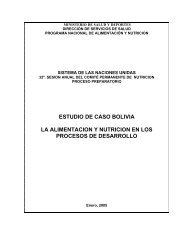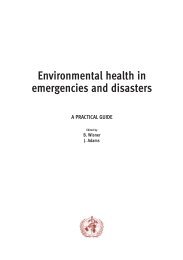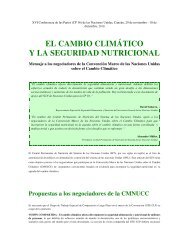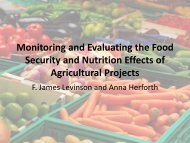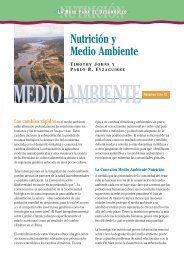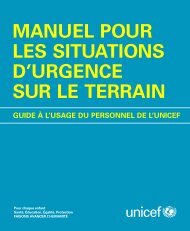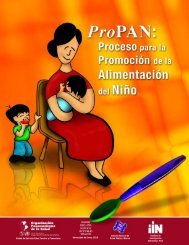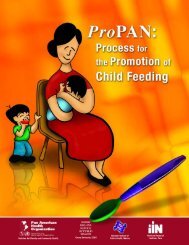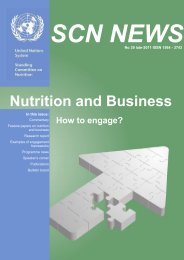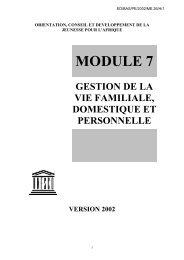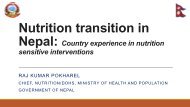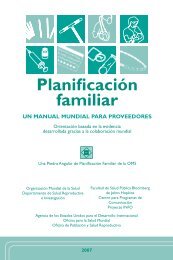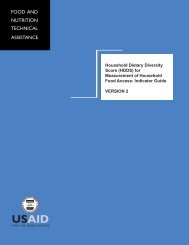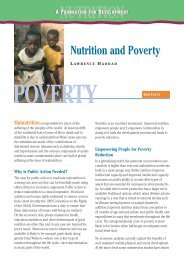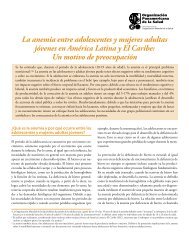SCN News No 36 - UNSCN
SCN News No 36 - UNSCN
SCN News No 36 - UNSCN
Create successful ePaper yourself
Turn your PDF publications into a flip-book with our unique Google optimized e-Paper software.
www.unsystem.org/scn SECRETARY’S ROUND-UP 3<br />
for oil prices to fall now is remote as global production capacity seems to have peaked. The price of food is<br />
strongly correlated with the price of oil, so there seems little likelihood of food becoming cheap again either. The<br />
unprecedented economic growth that has marked the last sixty years of global peace, has also meant that the<br />
demand for animal foods has grown enormously. Although the global grain production is double that needed to<br />
feed the global population, over a half of this grain is fed to animals. In addition the global population has almost<br />
doubled since 1970, and just over a half now live in urban areas. But in addition there are other important new<br />
drivers of the food price crisis now that didn’t exist thirty years ago and that make the situation now much more<br />
complicated. These include a globalized financial sector which allows speculation in the food commodity markets<br />
plus the provision of financial incentives to produce biofuels from corn as a response to the climate change crisis.<br />
How the Comprehensive Framework for Action will deal with all of these complex challenges still remain to be seen,<br />
but the results of the latest DOHA round at the World Trade Organization in Geneva this week are more likely to be<br />
the ones that will have the greatest impact on the likelihood of solving the crisis in the medium and long term.<br />
Hopefully the trade of agricultural products will be given a level playing field, as agreed by member states at the<br />
United Nations Conference on Trade and Development (UNCTAD), at its twelfth session in Accra (UNCTAD 2008).<br />
Another event which has placed nutrition on the international agenda this year is the Copenhagen Consensus<br />
which updated its ranked list of solutions to major world challenges from 2004. As Bjørn Lomborg, the founder and<br />
leader of this initiative said: “It’s not very often you get 5 <strong>No</strong>bel Laureates being locked up in the same room for<br />
4 days talking about the biggest world issues, and I hope that the dedication they’ve put into compiling this unique<br />
overview of the best spending options to improve the world will resonate with decision-makers all over the world.”<br />
From this economist point of view, interventions to address hunger and malnutrition rank at the top of the<br />
suggested solutions in terms of cost-benefit analysis, which will surely help bring further leverage to the advocacy<br />
claims of the nutrition community. The initiative is briefly described in this issue along with a Speaker's Corner<br />
commentary where the long-time <strong>SCN</strong> participant George Kent shares his own views (p.73).<br />
This year also sees the 60 th Anniversary of signing of the Universal Declaration of Human Rights (UN 1948), and<br />
as is explained in the Programme <strong>News</strong> section (p.65), there have been many important new achievements in this<br />
field in the first half of the year. In May the Human Rights Council held a special session on the negative impact of<br />
the food price crisis on the realization of the right to food. The session was called by the newly appointed UN<br />
Special Rapporteur on the right to food, Mr Olivier De Schutter. The Human Rights Council also approved by<br />
consensus an Optional Protocol to the International Covenant on Economic, Social and Cultural Rights, which<br />
brings one step closer the possibility of international remedy mechanisms for violation of this covenant.<br />
It is also encouraging that nutrition is being given a new priority by WHO (Chan 2008), which also celebrates its<br />
60 th Anniversary this year. It is great that Francesco Branca has been appointed to the Division of Nutrition in Health<br />
and Development of WHO. We welcome Francesco, who comes from being the regional adviser for the European<br />
Region of WHO, and wish him all success in his new role. Thanks are due to Jørgen Schlundt, who has served as the<br />
Acting Director of NHD for the last year, and who now returns to just looking after food safety in WHO. There are also<br />
new Chairs in the Civil Society constituency, with Ted Greiner taking over as Chair, with Ricardo Uauy, Urban Jonsson<br />
and Elisabet Sterken as Vice Chairs. In the bilateral constituency, Biram Ndiaye, previously Coordinator of the National<br />
Committee Against Malnutrition of Senegal, acted as Vice Chair for a short period before he joined UNICEF.<br />
In the meantime the call for a review of the international nutrition architecture made by the LNS has been heeded,<br />
and two reviews are in hand. The larger review of the international nutrition architecture is being supported by the Bill<br />
and Melinda Gates Foundation (BMGF), and the smaller review of UN coordination mechanisms has been carried<br />
out by the <strong>SCN</strong> Steering Committee. We look forward to seeing the results of these two processes being published.<br />
References<br />
Berg A (1973) The Nutrition Factor in Development. Brookings Institution Press.<br />
Chan M (2008) The global nutrition challenge: getting a healthy start. Keynote address by Dr Margaret Chan, Director-General<br />
of the World Health Organization at the Pacific Health Summit, Seattle, Washington, USA, 18.06.2008 (online).<br />
Maternal and Child Undernutrition Study Group (2008) Maternal and child undernutrition. The Lancet 371(9608-12). Available<br />
at www.thelancet.com/collections/series/undernutrition<br />
<strong>SCN</strong> (2008a) Report of the Standing Committee on Nutrition at its Thirty-Fifth Session. Hosted by the Vietnamese<br />
Government, Hanoi, Viet Nam, 3-6 March 2008. (online)<br />
<strong>SCN</strong> (2008b) <strong>SCN</strong>'s Awards of Merit 2008. (online)<br />
UN (1948) Universal Declaration of Human Rights. General Assembly res. 217 A (III) of 10 December 1948. (online)<br />
UNCTAD (2008) The Accra Declaration. Twelfth session. 20–25 April 2008. (online)<br />
back to contents <strong>SCN</strong> NEWS # <strong>36</strong>



